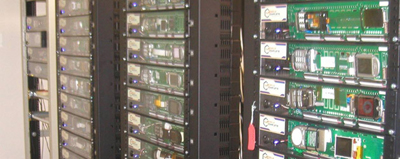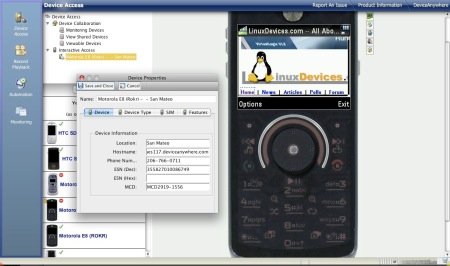Phone farm offers testing service
Jul 30, 2008 — by LinuxDevices Staff — from the LinuxDevices Archive — 3 views Mobile Complete has announced new capabilities for its remote testing service for smartphones. DeviceAnywhere's new “T-Mobile Virtual Developer Lab” adds access to more than 70 of the carrier's handsets, including the Linux-based Rokr E8 depicted at left browsing LinuxDevices.com from Mobile… Complete's San Mateo farm.
Mobile Complete has announced new capabilities for its remote testing service for smartphones. DeviceAnywhere's new “T-Mobile Virtual Developer Lab” adds access to more than 70 of the carrier's handsets, including the Linux-based Rokr E8 depicted at left browsing LinuxDevices.com from Mobile… Complete's San Mateo farm.
(Click for larger view of LinuxDevices on Motorola's Linux-based Rokr E8
DeviceAnywhere was first launched in 2003. It is touted as a “revolutionary” service availing developers of 1,500 real handsets on which to test their software applications. It obviates the use of emulators, instead providing live, remote access to actual devices, says Mobile Complete.

DeviceAnywhere claims remote access to 1,500 actual phones, housed in data centers (above)
According to the company, the supported phones have all been disassembled and placed in the company's data centers (above). Stationed in the U.S, Canada, France, Germany, the United Kingdom, and Japan, the centers allow each rack-mounted handset live access to their respective carriers, including the following:
- 3 (UK)
- AT&T
- Alltel
- Bell
- Boost Mobile
- Bouygues
- Helio
- KDDI
- NTT DoCoMo
- O2
- Orange
- SFR
- Softbank
- Sprint
- T-Mobile
- Verizon
- Willcom
DeviceAnywhere subscribers access the devices from their desktops using a Java-based application called DeviceAnywhere Studio, pictured below. Mobile Complete claims anything that a user could do with the device in his or her hand, they can do with the handsets remotely. Examples include pressing device buttons, tapping on touch screens, connecting or disconnecting the battery, listening to ringers and speakers, and opening or closing the device.

DeviceAnywhere Studio provides remote access to any device offered by Mobile Complete
(Click to enlarge)
As well as simply providing remote access, DeviceAnywhere Studio is also said to capture handset screen shots, sounds, and keystrokes as movies, automatically. In addition, it allows interacting with multiple devices concurrently so that, for example, users can test peer-to-peer applications between a device in San Francisco and one in London.
Finally, DeviceAnywhere Studio permits recording interactions with a device into a script that can be played back on demand. This allows for rapid comparison of different devices or changed configurations, according to the company.
The DeviceAnywhere enhancements announced this week apparently provided no new features, but do provide access to more than 70 new T-Mobile handsets. While T-Mobile's version of the Linux-based Rokr E8 is available, the newer Linux-based Razr2 V8 does not appear to be available yet. However, Mobile Complete says it can add devices on request.
Further information
DeviceAnywhere is offered on a subscription basis, with access to a specific collection of devices priced at a flat $100 per month, plus $16 per hour. A senior offering, DeviceAnywhere Pro, includes a bevy of scripting, reporting, and scheduling capabilities, and costs $1,000 per month for two user licenses.
Additionally, three-hour trial accounts are available here (free, with registration). More information may be available from the Mobile Complete website, here.
This article was originally published on LinuxDevices.com and has been donated to the open source community by QuinStreet Inc. Please visit LinuxToday.com for up-to-date news and articles about Linux and open source.